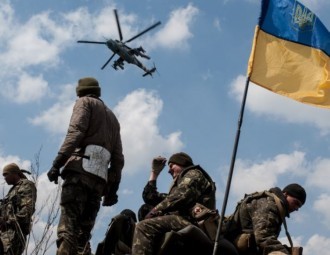Uladzimir Matskevich: The only Ukraine’s action to stop the war is to end the anti-terror operation

Neither Russia nor Ukraine or the EU bring to Minsk any feasible suggestions of how to terminate the war, so there are no grounds to hope for the favorable end of the negotiations.
On August 26 Ukraine-EU-Customs Union negotiations on the resolution of the Ukrainian conflict took place in Minsk. The negotiating parties were Russia and the EU; however, Russia involved the participants of the Customs Union – Belarus and Kazakhstan – in order to demonstrate that Russia is not isolated.
Uladzimir Matskevich, the head of the Board of the International Consortium “EuroBelarus”, stated that in the interview with the “EuroBelarus” Information Service.
- On August 26 Minsk hosted negotiations between Ukraine, Russia, the leaders of the Customs Union, and the EU representatives. It is but logical that the cessation of the war was the topic of the negotiations. However, each party had its own goals. Which ones?
- The negotiations in Minsk happened between Russia and Ukraine with the mediation of the EU, it was established at the beginning. However, such format puts Russia in a row of isolated countries that lead war against an independent state. To create the illusion of non-isolation, of international alliance, Russia imposed the participation in these negotiations to Belarus and Kazakhstan. Neither Belarus nor Kazakhstan had independent position at negotiations, so they were invited as statists, to picture Russia’s non-isolation.
The fact that Belarus and Kazakhstan approved of Russia’s policy means that they are also participating in the aggression against Ukraine.
Judging from the national interests, Belarus and Kazakhstan are interested in cessation of the war as much as Ukraine. So it would have been logical if Belarus and Kazakhstan took Ukraine’s side; however, strong dependence on Russia prevented them from demonstrating the position originated from their national interests.
- Over the last time Kremlin has more than one mentioned ceasefire. Is it at all possible, when Russia is unilaterally introducing a “humanitarian convoy” to Ukraine’s territory, which Kiev already named “an open invasion”? Quite simply, in the foreign country Russia feels and acts at home.
- The hypocrisy and cunningness of Russian politics and diplomacy are obvious to everyone with unbiased stance, and that is why Russia's words about peace sound so falsely. If Kremlin really wanted peace, then its first and foremost actions would be to stop supporting armed groups, to withdraw its soldiers without identification marks, and to stop consulting the gunmen. If Russia wanted it could immediately stop the war.
It is strange that in Russia there is no pacifist movement that would demand the cessation of the war from the party to the war that is able to do that. People in Russia are demanding the official Kiev to stop the war, while only Russia can do that.
I have no certain optimism regarding the successful results of the negotiations. Neither Russia nor Ukraine or the EU bring to Minsk any feasible suggestions of how to terminate the war, so there are no grounds to hope for the favorable end of the negotiations.
The only realistic action Ukraine can make to stop the war would be to end the anti-terror operation, i.e. to banish illegal armed groups consisting of Russians and Ukrainians from the country.
- Lately Lukashenka’s attempts to play the role of a peacemaker have been discussed a lot. Will he be able to manage with this role?
- It is only Lukashenka’s ideologists, Belarusan media, and some unofficial groups claiming to be analytical centers that are discussing these attempts.
Belarus is a small country, and Lukashenka is not a very popular and respected figure; so he won’t be able to manage with that.
- In comparison with Putin Belarusan dictatorship seems a smaller evil and better partner for the West. Will Lukashenka manage to use the Ukrainian tragedy in order to break through the international isolation? No serious politician perceives Lukashenka as a peacemaker – his reputation is too bad.
- And this is just what is happening. Lukashenka is trying to use the situation in order to change his image and step out of isolation, stop being a persona non-grata. And Europe, West, USA is ready to facilitate him in that. We see that the West has steeply changed its attitude to Iran, lifting embargo on oil delivery. Now Iran is becoming an alternative to Russia in oil delivery.
The attitude towards Belarus is changing likewise as to Iran. But it isn’t Lukashenka’s merit; he did nothing to improve his image and the image of Belarus. It is just that the real politics and international conjuncture demand milder attitude to such countries as Belarus and Iran.
-
03.01
-
07.10
-
22.09
-
17.08
-
12.08
-
30.09








































